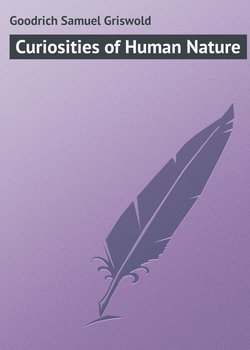Читать книгу Curiosities of Human Nature - Goodrich Samuel Griswold - Страница 13
EDMUND STONE
ОглавлениеOf the life of this extraordinary man we have little information. He was probably born in Argyleshire, Scotland, at the close of the seventeenth century. His father was gardener to the Duke of Argyle, and the son assisted him. The duke was walking one day in his garden, when he observed a Latin copy of Newton's Principia, lying on the grass, and supposing it had been brought from his own library, called some one to carry it back to its place. Upon this, young Stone, who was in his eighteenth year, claimed the book as his own. "Yours!" replied the duke; "do you understand geometry, Latin, and Newton?" "I know a little of them," said the young man.
The duke was surprised, and having a taste for the sciences, he entered into conversation with the young mathematician. He proposed several inquiries, and was astonished at the force, the accuracy and the clearness of his answers. "But how," said the duke, "came you by the knowledge of all these things?" Stone replied, "A servant taught me to read ten years since. Does one need to know anything more than the twenty-six letters, in order to learn everything else that one wishes?"
The duke's curiosity was now greatly increased, and he sat down upon a bank and requested a detail of the whole process by which he had acquired such knowledge. "I first learned to read," said Stone; "afterwards, when the masons were at work at your house, I approached them one day, and observed that the architect used a rule and compass, and that he made calculations. I inquired what might be the meaning and use of these things; and I was informed that there was a science called arithmetic. I purchased a book of arithmetic, and studied it. I was told that there was another science, called geometry. I bought the necessary books, and learned geometry.
"By reading, I found there were good books on these two sciences in Latin; I therefore bought a dictionary and learned Latin. I understood, also, that there were good books of the same kind in French; I bought a dictionary and learned French; and this, my lord, is what I have done. It seems to me that we may learn everything when we know the twenty-six letters of the alphabet."
Under the duke's patronage, Stone rose to be a very considerable mathematician, and was elected a member of the Royal Society of London, in 1725. He seems to have lost the favor of the Duke of Argyle, for, in the latter part of his life, he gave lessons in mathematics, and at last died in poverty.
